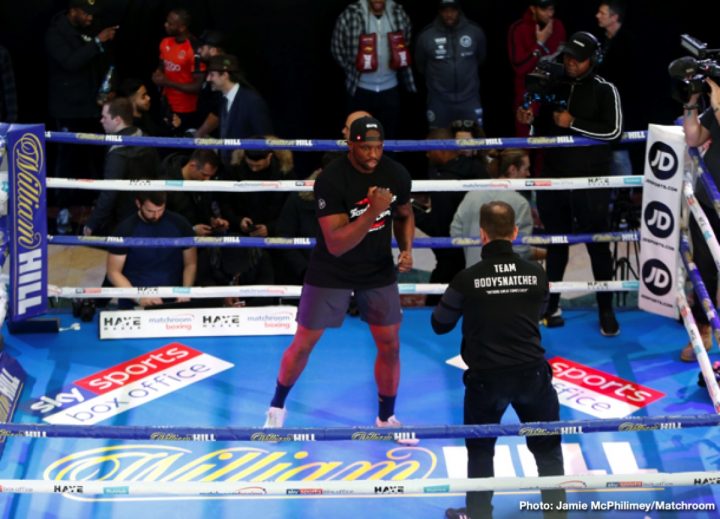
By Trevor McIntyre: The winner of this Saturday’s fight between Dillian Whyte and Dereck Chisora won’t necessarily be penciled in by Matchroom Boxing promoter Eddie Hearn for IBF/IBO/WBO heavyweight champion Anthony Joshua’s next title defense on April 13 at Wembley Stadium. According to Hearn, the Whyte-Chisora winner is the third option for Joshua’s next fight in April, behind the following choices: 1. Deontay Wilder and 2. Tyson Fury.
This is the order Hearn’s options for Joshua’s next fight on April 13:
1. Deontay Wilder
2. Tyson Fury
3. Dillian Whyte vs. Dereck Chisora 2 winner
4. Oleksander Usyk
5. Luis ‘King Kong’ Ortiz
If Hearn can’t get either of those two heavyweights [Wilder or Fury] to agree to fight Joshua (22-0, 21 KOs) on the 13th of April, then he’ll look to the Whyte vs. Chisora 2 winner. There’s obviously less appeal for a second fight between Joshua and Whyte with the boxing public. Joshua, 29, already knocked Whyte out in the 7th round three years ago in December 2015. The Joshua vs. Whyte fight wasn’t competitive enough to create a high demand from the boxing public for a rematch between them.
Hearn’s main reason for wanting to bring Joshua and Whyte back together in a second fight is the previous match between them brought in high ratings. Based on that, Hearn believes that a second fight would also do great numbers. However, Hearn would still prefer to match Joshua against Wilder or Fury for April 13. Either of those fights would be massively popular in the UK, and would easily sellout Wembley Stadium, and bring in huge numbers of pay-per-view buys on Sky Box Office.
“If AJ can’t fight Wilder or Tyson Fury, we look to the winner of [Whyte vs Chisora] and say: ‘that’s probably where our opponent will come from’,” Hearn said to skysports.com.
What could prevent Hearn from getting Wilder of Fury to agree to fight Joshua is the possibility of them facing each other in a rematch. Wilder-Fury fought to a controversial 12 round split draw on December 1 in the United States, and they would like to face each other again so that a winner could be decided. The other thing stopping Hearn from getting the likes of Wilder or Fury to agree to a fight with Joshua is the purse split for the fight.
Hearn strongly believes that Joshua deserves the lion’s share of the money for a fight against the unbeaten Wilder (40-0-1, 39 KOs) and Fury (27-0-1, 19 KOs), and that’s not something they would be agreeable to. Hearn’s flat fee offer to Wilder of $15 million for a fight against Joshua last September shows how much he values the American. That offer is considered to be on the extreme low side by many boxing fans. Additionally, Hearn believes that Joshua brings much more to the table financially than Wilder, and that belief could make it difficult for a fight to be put together between the two fighters.
“Wilder, Fury, the winner of [Whyte-Chisora], Oleksandr Usyk, Luis Ortiz. These are all guys that AJ has to go through in the next three years,” Hearn said.
Hearn states that Wilder is the one that he and Joshua want most of all for the April 13th fight. Nevertheless, he’s going to be the most difficult potentially to get to agree to the fight, as he wants a 50-50 purse split, and he still has the option for the rematch against Fury. Wilder isn’t in a desperate position to where he needs to agree to the lower money offers that Hearn will try and get him to agree to for a fight against Joshua. Without a change of stance from Hearn and Wilder when it comes to the purse split for the fight with Joshua, it would seem unlikely that a fight can be made in the foreseeable future.
Joshua has looming mandatory defenses that are going to be coming soon for his IBF, WBA and WBO belts that he’ll need to satisfy. That’s one of the reasons why Hearn wants to get the fights with Wilder and Fury done now while he still can before Joshua starts getting ordered by those three sanctioning bodies to defend against their mandatory challengers.